
In the first of two articles, Nicholas Bevan explains why he believes the MIB is liable for defects in the Road Traffic Act
Motor accident victims are entitled to claim compensation directly from the Motor Insurers’ Bureau (MIB) for incidents that ought to be covered by the compulsory third party insurance provisions of Pt VI of the Road Traffic Act 1988 (RTA 1988) but where, due to the secretary of state for transport’s inaction, they are not.
Longstanding non-conformity
Between them, ss 143 and 145 RTA 1988 prescribe the nature and extent of the compulsory third party motor vehicle insurance requirement. This confines its geographic scope to use in public places (see s 185) and it is further restricted to motor vehicles intended or adapted for road use (see s 192). However, these constraints are clearly incompatible with the broader scope of the European Directive (2009/103/EC) on motor insurance (the Directive).
Articles 3 and 10 of the Directive set out the scope of the third party motor insurance requirement as well as the









